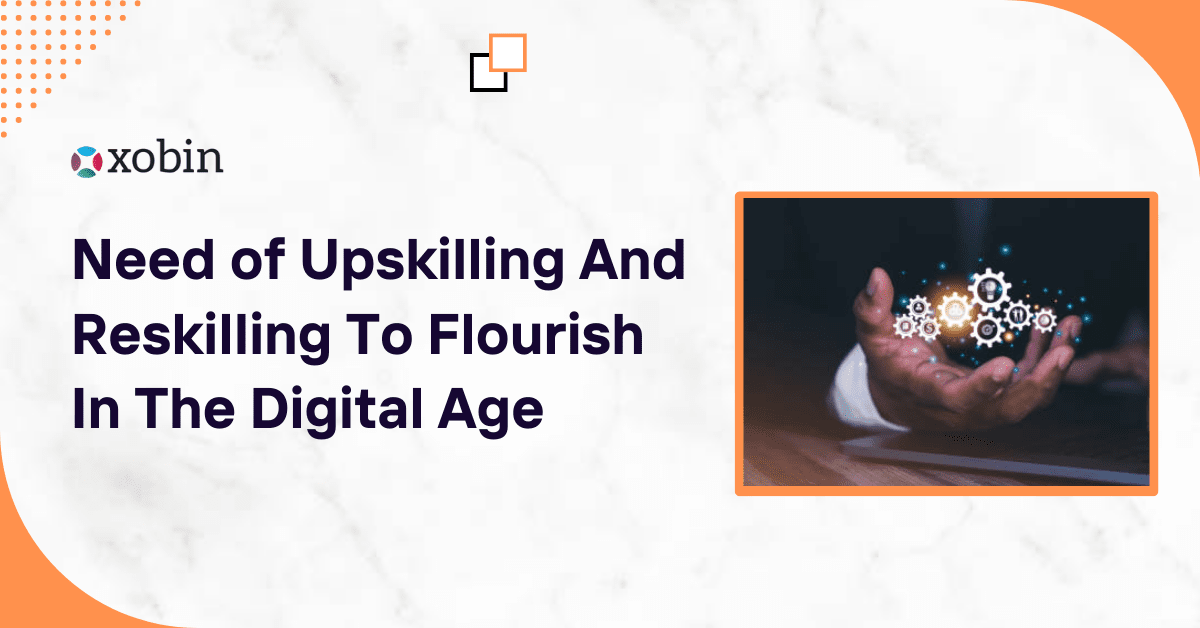The events of the last few years have transformed the way we work around the world. The COVID-19 pandemic functioned as a catalyst and played a big role in bringing the globe into the digital era. As a result, the AI revolution with AI in recruitment began even before the pandemic ended. The developments we’ve witnessed have created both significant benefits and challenges for businesses and their employees in every field. To not only survive but also prosper in this fast-changing work environment, industries and businesses must use upskilling and reskilling to improve the knowledge of their employees to keep up with the market’s ever-changing needs. This blog will delve into the intricacies of the need for upskilling and reskilling in this rapidly evolving digital age.
Table of Contents
Why are Upskilling and Reskilling Important in the Digital Era?
We live in an era where businesses are proactively adopting digital technology into their workflow. To add to this, these technologies themselves are in a state of continual evolution. As a result, the need for the existing workforce to enhance their skills is becoming a necessity. Skills that were once deemed and sufficient for employment no longer cut the mustard. Hence, the need to upskill and reskill is must today.
However, employees face unpredictability as a result of technical improvements and economic changes, which implies that employment roles can evaporate overnight. Upskilling and reskilling provide individuals with a safety net, making them more agile in finding new employment opportunities. With the adoption of new technologies poised to be the trend for the coming years, upskilling and reskilling will also open doors for career advancement. Hence, from an organizational point of view, the digital age has brought about a global economy where competition knows no boundaries. Having a highly skilled team adept in the latest tech can mean the difference between staying on top of the pyramid or falling into oblivion.
Therefore, here we have established the pertinence of upskilling and reskilling. So, let’s have an in-depth look at how employers can successfully implement them within their organizations.
Identifying Skill Gaps
As per the Future of Jobs Report, rate at which businesses are adopting new technologies, almost 50% of all employees will be reskilled by 2025. The rest will need to be reskilled every year
Employers can take a number of approaches to identify skills gaps, such as:
Perform a Skill Gap Analysis
In the simplest of terms, a skills gap analysis is a comparison of the skills needed to perform a specific role vs. those that current employees process. The data obtained from this exercise can then be used to bridge the skills gap either via investing in learning and development or by strategic hiring.
Consult the Management
A skills gap analysis is usually an exercise by the HR department of an organization. Management, on the other hand, has a better understanding of the inner workings of their specific departments and will have better insights on specific skills that make their team work more efficiently. Working with managers is one of the best ways to identify skill gaps within specific departments.
Talk to your Employees
One of the best ways to get information is to get it right from the source. Most employees take cognizance of their current skills and are willing to upskill themselves to stay ahead of the competition. A sit down with employees will give you first-hand information on where to focus your upskilling and reskilling efforts.
Leveraging Technology for Upskilling and Reskilling
The need for upskilling and reskilling the workforce has also given rise to a plethora of technologies to help them do so. Here are some specific examples of technologies that can help with upskilling and reskilling:
Online Learning Platforms
One of the primary privileges the digital age offers is easy access to learning. Online learning platforms like Skillshare, Coursera, and Udemy, to name a few, offer courses on a wide range of topics along with certifications that anyone can pursue at their own pace and from any location. This allows a person to immerse themselves in a new culture and gain practical skills, all within their own comfort zone.
Learning Management Systems
Learning Management systems are a step above online learning platforms and are a potent tool to possess where upskilling and reskilling are concerned. Hence, a centralized location for all learning content within an organization is provided.
Best Practices in Upskilling and Reskilling
Adhering to certain best practices can make a massive difference in your upskilling and reskilling exercises. The most important of them are:

Plan ahead
Reskilling and upskilling is a complex process, especially when undertaken on an organizational scale. Start with a skills gap analysis and then take into consideration the resources and investment needed to achieve your desired results with the best bang for your buck.
Embrace bespoke learning
One-size-fits-all learning strategies are yesterday’s news. Personalized learning infused with gamification is now a tried and tested learning methodology that guarantees better employee engagement and knowledge retention.
Train on the job
Theoretical knowledge, while great, cannot replace first-hand experience. Practices such as shadowing, mentoring, peer coaching, and role-swapping are great ways to provide on-the-job learning.
Don’t ignore the importance of soft skills
While technical skills are no doubt important, developing soft skills such as problem-solving or critical thinking can make all the difference in how employees perform as a whole.
Upskilling and Reskilling: Potential Challenges
Generally speaking, change is not something we as a species handle well. Resistance to change when attempting to upskill or reskill your workforce can be a potential challenge. Add to this, an employee’s pre-existing workload and time constraints are major factors to consider.
Also, open communication, highlighting the benefits of these initiatives and good training management. Hence, offering flexible learning options like using the best LMS can help alleviate such concerns.
Summing it Up
Upskilling and reskilling are no doubt the need of the hour to stay abreast with the pace at which the world is changing around us. While employers may encounter resistance, effectively communicating that this exercise is in the best interest of the employees and the organization alike can make all the difference. The best practices outlined in this blog, along with the strategic use of the best technologies.






